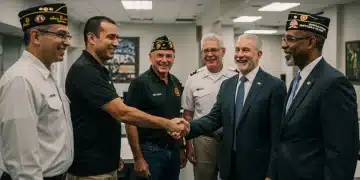Interview veterans benefit overview: what you need to know

Veterans can access various benefits and resources, including healthcare, education assistance, and housing support, through government agencies, nonprofits, and local community organizations.
Interview veterans benefit overview reveals essential insights into the support available for those who served. This guide aims to clarify programs and resources, helping veterans navigate their options effectively. Let’s explore how these interviews can make a difference.
Understanding veteran benefits and services
Understanding veteran benefits and services is crucial for those who have served in the military. With numerous programs available, veterans can access various resources to improve their lives.
Types of Benefits Available
Veteran benefits encompass a range of services designed to assist individuals in different aspects of life. Some key areas covered include:
- Healthcare: Veterans are eligible for healthcare services through the Department of Veterans Affairs (VA), offering comprehensive medical care.
- Education: Programs such as the GI Bill provide financial assistance for education and training.
- Housing: Veterans can access housing assistance, including VA loans for purchasing homes.
- Disability Compensation: Some veterans may qualify for benefits due to service-related disabilities.
These benefits are designed to support veterans in various stages of life, ensuring they have access to necessary resources.
How to Access Benefits
To access these benefits, veterans should know the application processes. The VA provides an online platform where veterans can apply for benefits and track their applications. It is essential to collect the required documents, such as military discharge papers and personal identification, before starting the application.
Many veterans find assistance through local veteran service organizations that can guide them through the application process. These organizations often host informational sessions about available benefits and help veterans navigate the system.
Key Considerations
When exploring veteran benefits, it’s important to keep a few key considerations in mind:
- Eligibility: Ensure you meet the eligibility requirements for each program.
- Deadlines: Be aware of any deadlines for applications to avoid missing out on benefits.
- Changes in Policies: Stay updated on policy changes that may affect available services.
By understanding the benefits and services available, veterans can make informed decisions and access the support they deserve.
Steps to prepare for a veteran interview
Preparing for a veteran interview can greatly enhance the experience. Taking the time to gather information and organize your thoughts is essential to make the most of this opportunity.
Researching Available Benefits
Before the interview, it’s important to understand the benefits and services available to veterans. Explore the websites of organizations like the Department of Veterans Affairs, which provide comprehensive information. Knowing what benefits you’re eligible for will help you ask informed questions during the interview.
- Familiarize yourself with the different types of benefits, such as health care and educational assistance.
- Identify your needs and decide which benefits are most relevant to you.
- Prepare questions you want answered, so you can clarify any doubts.
In addition to researching benefits, gather necessary documents ahead of time. This might include your discharge papers, records of service, and any past medical records if applicable.
Practice Common Interview Questions
It’s also beneficial to practice answering common questions that might be asked in the interview. This could include inquiries about your military service, how you are doing, and what specific support you need.
- Reflect on your experiences and think about how they relate to the benefits you’re seeking.
- Prepare to discuss any challenges you face as a veteran, and what support you would find helpful.
- Keep your answers concise and clear, ensuring you communicate effectively.
Lastly, consider the logistics of the interview. Confirm the time and location or whether it will be conducted virtually. Arriving early, dressing appropriately, and being respectful can help create a positive impression.
By following these steps and being prepared, you will be better equipped to navigate the veteran interview successfully. Being informed and confident will help you make the most of the services available to you.
Common questions during veteran benefit interviews

During veteran benefit interviews, having a clear understanding of common questions can prepare you to respond effectively. Knowing what to expect can help ease anxiety and make the process smoother.
Typical Interview Questions
Here are some of the most frequently asked questions that you might encounter in a veteran benefit interview:
- What is your military background? Be ready to discuss your service history, including the branch you served in and your time in service.
- What specific benefits are you seeking? Clearly articulate the benefits you are looking for, whether they relate to health care, education, or housing.
- Are you currently experiencing any health issues? Be honest about any health challenges you may face as a result of your service.
- Have you applied for benefits before? Discuss your past experiences with the application process and any previous benefits received.
Responding to these questions with thoughtful answers can help demonstrate your understanding of your needs and build a rapport with the interviewer. Take the time to formulate your responses ahead of the interview.
Additional Considerations
Aside from the typical questions, be prepared for inquiries related to your future plans. Interviewers might want to know how the benefits you seek will support your goals. This is a great opportunity to express your aspirations, whether they involve education, career development, or health improvement.
It’s also important to be open about any challenges you’ve faced. Sharing your experiences can convey the impact of your service and how it has shaped your current situation.
Overall, understanding the common questions you might face during a veteran benefit interview will empower you to present your case confidently. Proper preparation is key, and being honest with your answers will ensure that you get the support you need.
Tips for a successful veteran interview
Preparing for a successful veteran interview involves several key strategies. These tips can help you approach the interview with confidence and clarity.
Dress Appropriately
First impressions are important, so dressing appropriately can set a positive tone. Wear professional attire to show respect for the interview process.
- Choose clean, pressed clothing that fits well.
- Avoid overly casual outfits like t-shirts or jeans.
- Consider wearing comfortable shoes since you may be sitting for a while.
Being well-dressed not only demonstrates professionalism but can also boost your confidence during the meeting.
Be Punctual
Arriving on time is crucial for any interview. It shows that you value the interviewer’s time and are serious about your situation. Aim to arrive 10-15 minutes early to give yourself time to relax before the interview starts.
Bring Necessary Documents
During the interview, bringing along relevant documents can help support your case. This might include your discharge papers, medical records, and any previous benefit applications.
- Ensure all documents are organized in a folder for easy access.
- Make copies of important papers for the interviewer.
- Highlight key information within your documents that you may reference.
Having these documents on hand will demonstrate your preparedness and help the interviewer understand your benefits needs better.
Practice Active Listening
During the interview, it’s important to listen attentively to the questions being asked. This not only shows respect but also helps you provide relevant answers. Nod and respond appropriately to show that you are engaged. If you don’t understand a question, it’s okay to ask for clarification.
Remember, the goal of the interview is to communicate your needs and understand the benefits available to you. Following these tips can lead to a more productive discussion and help you achieve your objectives.
Resources for veterans seeking additional support
There are many resources available for veterans seeking additional support. Understanding where to look can help you find the assistance you need.
Government Agencies
One primary source of support is the government. The Department of Veterans Affairs (VA) offers various services to help veterans with health care, benefits, and transition assistance.
- Veterans Health Administration (VHA): Provides health care services specifically for veterans.
- Veterans Benefits Administration (VBA): Focuses on benefits like education, home loans, and disability compensation.
- National Cemetery Administration (NCA): Offers burial benefits and services for veterans.
Each of these branches can assist veterans in understanding and accessing their rights and benefits.
Non-Profit Organizations
In addition to government resources, several nonprofit organizations are dedicated to supporting veterans. These organizations provide a variety of services, from counseling to job placement.
- Veterans of Foreign Wars (VFW): Offers support and advocacy for veterans, helping them navigate benefits and resources.
- American Legion: Provides community support and various programs for veterans and their families.
- Wounded Warrior Project: Focuses on helping veterans with physical injuries and mental health challenges.
Connecting with these nonprofits can provide veterans with vital assistance and networking opportunities.
Community Resources
Local community programs also play a crucial role in supporting veterans. Many communities have organizations that focus specifically on veterans’ issues, providing resources tailored to local needs.
Local Veterans Affairs offices can offer information about available services and events in your area. Connecting with local chapters of national organizations can also yield support and guidance tailored to your situation.
By exploring the various resources available, veterans can find meaningful support to help them thrive in their post-military lives.
In conclusion, veterans have access to a wide array of resources that can help them navigate their benefits and improve their quality of life. By understanding the various government, nonprofit, and community organizations available, veterans can find the support they need. Preparation for interviews is essential, and knowing what to expect can lead to successful outcomes. Remember, reaching out for help and utilizing these resources is a significant step toward a fulfilling post-military life.
FAQ – Frequently Asked Questions about Veteran Benefits
What resources are available for veterans seeking support?
Veterans can access government agencies like the Department of Veterans Affairs, local nonprofits, and community organizations for support.
How can I prepare for my veteran benefit interview?
Preparation includes gathering necessary documents, practicing common interview questions, and dressing professionally.
What type of benefits can veterans apply for?
Veterans can apply for healthcare, education assistance, disability compensation, and housing support among other benefits.
How can I find local veteran resources?
Check with local VA offices, veteran service organizations, or community centers that offer programs specifically for veterans.





